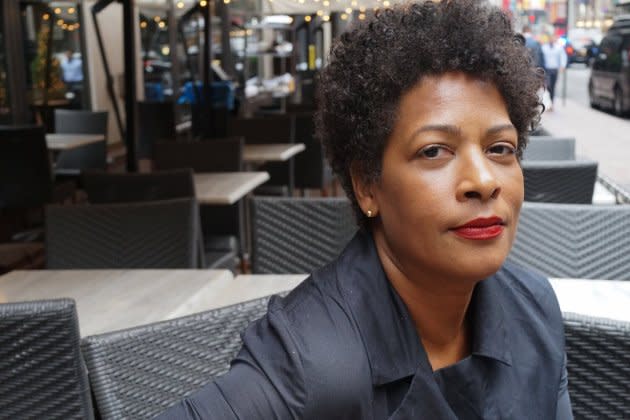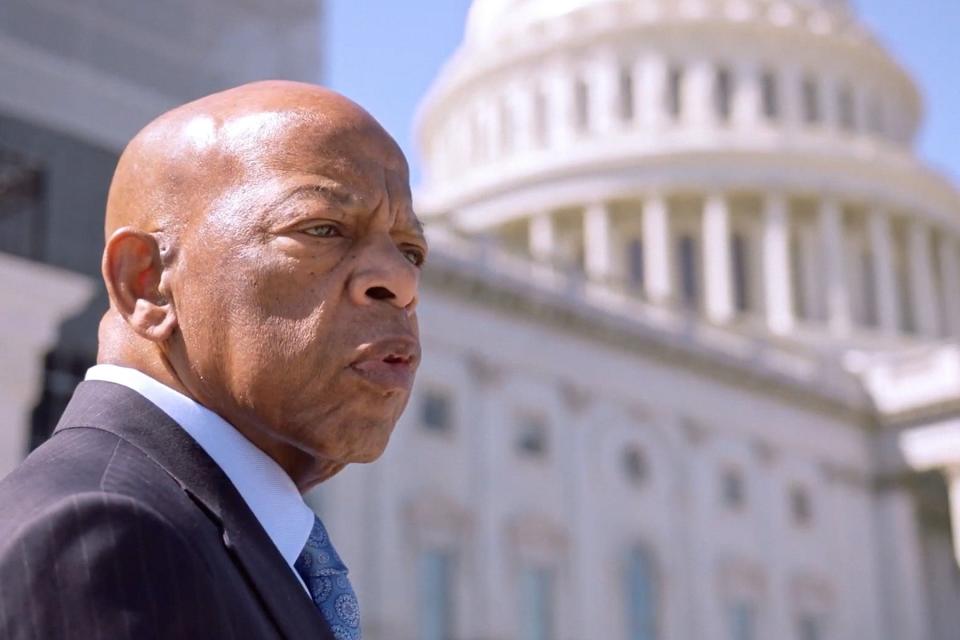Dawn Porter’s Massive 2023: Lady Bird Johnson and Taking on SCOTUS
- Oops!Something went wrong.Please try again later.
- Oops!Something went wrong.Please try again later.
- Oops!Something went wrong.Please try again later.
- Oops!Something went wrong.Please try again later.

Dawn Porter looks for stories of people who made history without asking. By following congressman and civil rights leader John Lewis in John Lewis: Good Trouble, or President Obama’s White House photographer Pete Souza in The Way I See It, she says she hopes to shade in between the lines of history.
In her most recent project, Hulu’s The Lady Bird Diaries, she fixates on Lady Bird Johnson’s life, relying largely on archival audio recordings that were released following the former first lady’s death in 2007. In her more than 123 hours of diary recordings, Johnson reflects on a tumultuous two terms in the White House, including the assassinations of John F. Kennedy and Martin Luther King, Jr., and expresses concern for her husband Lyndon B. Johnson’s bouts of depression while juggling motherhood and urban “beautification” policies. She also directed the 2023 Showtime docuseries Deadlocked: How America Shaped the Supreme Court, about the history of SCOTUS and its confirmation process, and her doc Luther: Never Too Much, about R&B legend Luther Vandross, will premiere in January at the 2024 Sundance Film Festival.
More from Rolling Stone
'SNL': Billie Eilish Performs 'Barbie' Song With Greta Gerwig Intro
'SNL': Kate McKinnon Reunites With Maya Rudolph, Kristen Wiig for Christmas
Isabel Wilkerson's 'Caste' Sets Hauntingly Familiar Scene in Ava DuVernay's 'Origin' Trailer
But Porter’s work expands beyond the halls of power. Documentary films like Gideon’s Army (2013), which follows three young public defenders in the American South, or Trapped (2016), wherein reproductive health care providers struggle to keep their clinics open amid new abortion regulations, highlight the plight of the underrepresented.
As a corporate litigator for five years, Porter says she never dreamt of making movies, but had a burning desire to transform so-called victim narratives into ones of political and social strength. Soon, Porter was hired as an ABC News director of standards and practices. When Jackie Glover, former head of documentary films at ABC News Studios, first met Porter she was moved by her drive and enthusiasm despite her limited experience in documentary filmmaking.
“She put her whole self into being a documentarian,” Glover, who was an executive producer on The Lady Bird Diaries, tells Rolling Stone. “Once she did Gideon’s Army, she never stopped.”
Rolling Stone caught up with Porter to discuss her massive year.
You mentioned your interest in stories involving civil rights, motherhood, and women’s rights, but what led you to pursue Lady Bird Johnson’s story?
I feel like Lady Bird and really all first ladies and too many women, we don’t see them as full people. We see them as the wife or the partner-of, and so I thought, what if we center her voice? What if she is the person whose eyes we’re seeing [in] this time in history?
What was the archival research process like?
So, [when] we put her name in we got almost nothing. We put in Mrs. Johnson, a little bit more. President’s wife, no name, a lot more. Well, in the past, I was looking for footage about men. I was looking for footage about John Lewis. I was looking for footage about Bobby Kennedy. I got Thurgood Marshall. I got tons of footage hits for the men, all of whom I admire. Why is there no mention of the women? Lady Bird was a really meticulous diarist, and she would note when there was a recorder at a speech or an event, so we started looking at her diary and then making the record.
Despite being a trained journalist, Lady Bird refused to release her diaries until after her death. Why do you think that is?
She speaks so expressly about Johnson’s depression, for example. I think she tells personal stories and I think she’s thinking, well, after they’re both gone, let historians make of it what they will. It allowed her to be a little more open. Of course, two big things: One is that Johnson was going to resign during the State of the Union and that she wrote his resignation letter, and then the other is that she was the person who planned out how long he would stay in office. That’s pretty remarkable. So she says: finish Jack Kennedy’s term, run twice, and then step down in March, and that is exactly what happened.

You traveled with John Lewis for about a year for John Lewis: Good Trouble. What was it like shadowing the civil rights icon?
John Lewis, I swear to goodness, he was the kindest, calmest person to be around. He was unassuming. He had a great sense of humor. He would do something that he thought was funny, and then he would look and be like, “Did you see that?”
Do you have a favorite memory with him?
We took him back to his home, his initial home, and he invited some of his classmates, and a former teacher came. We all sat outside, and they told stories about listening for his name on the radio. They told stories about what it was like to be a teenager in the early 1960s, while all of this was happening. You can never replace that — that gathering of elders. And John Lewis was the quietest person.
Since shifting from a corporate litigator to documentary filmmaker, what’s one thing you did not expect?
Ava DuVernay, I’ve had the opportunity to say to her, “Thank you for doing what you’re doing, and showing us that a girl can be in the chair.” And Ava did this amazing thing where it was Sundance one year and she had a bunch of directors of color together at a lunch and she gave us all director Barbies. No one wants to be the only. I find no joy in being the only. I’m not the only, obviously, but we need to have more people of all different backgrounds who are making the choices about where to put that camera.
Best of Rolling Stone


